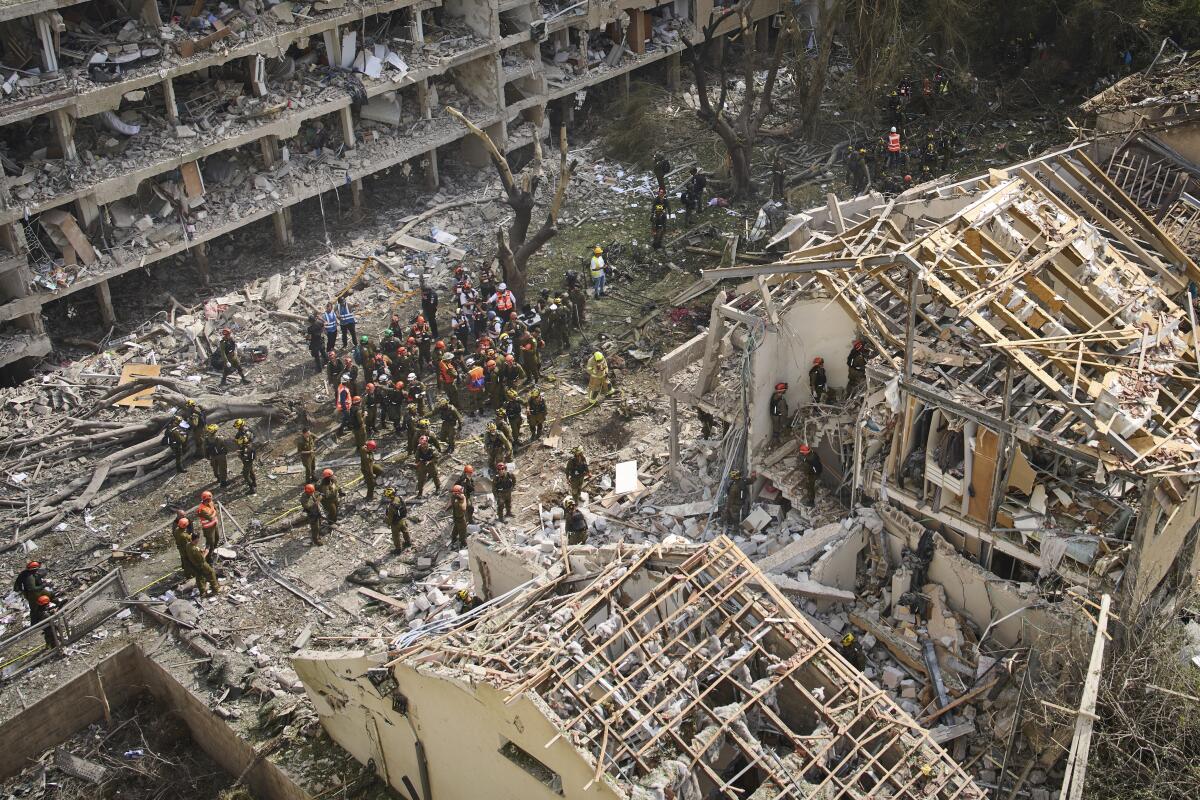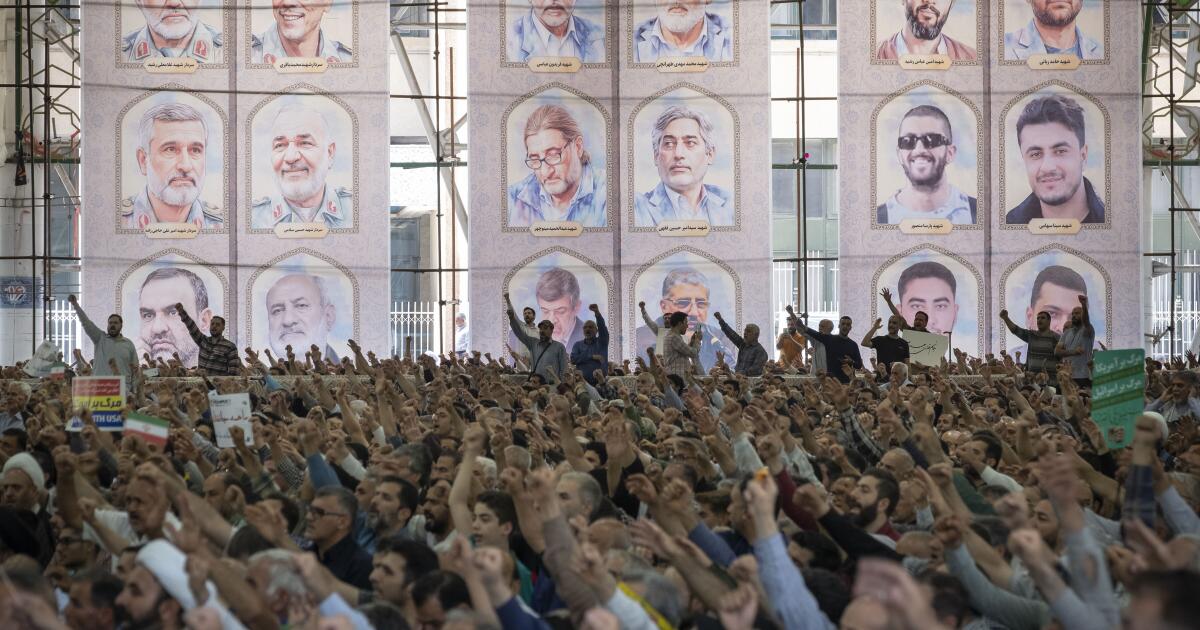BEIRUT — After a swiftly cobbled collectively ceasefire between Israel and Iran took maintain on June 24, Israeli Prime Minister Benjamin Netanyahu jubilantly declared that the “existential threats” of Iran’s nuclear program and ballistic missile arsenal had been destroyed. The “historic victory,” he stated, would “abide for generations.”
However almost two weeks after President Trump deployed 30,000-pound bombs and Tomahawk missiles in opposition to Iran’s nuclear services, questions linger over how abiding that victory will show to be. At the same time as U.S. and Israeli intelligence companies proceed assessing the strikes, and the White Home insists Tehran could acquiesce to a grand discount for peace within the area, analysts say the hostilities have been much less a finale than a prelude to the following act.
“There might be a sequel. The warfare stays an unfinished undertaking, for each side,” stated Bader Al-Saif, a professor of historical past at Kuwait College. Israel, he added, “needs to see the top of the Iranian regime or a extra critical decapitation of its capabilities.”
For the Islamic Republic’s leaders, who’ve defied and antagonized Israel — and the U.S. — for many years, that they emerged bruised however not overwhelmed serves as proof they need to proceed.
“Whatever the superiority of Israeli and American firepower, they’re nonetheless there,” Al-Saif stated. “And so they’re there for the long term.”
Israel’s 12-day marketing campaign is the primary time the long-running shadow battle between the Center East’s army superpowers exploded into open warfare, decapitating the higher echelons of Iran’s army and nuclear management. Israel’s spy service carried out elaborate sabotage operations on Iranian soil. Wave after wave of airstrikes killed tons of of individuals and turned important installations, infrastructure and metropolis neighborhoods into piles of rubble.
Smoke rises from a command heart of the Islamic Revolutionary Guard Corps north of Tehran on June 23, after being focused by Israel.
(ELYAS / Center East Photos )
From the second Trump introduced the B-2 Spirit bomber strikes, he and different members of his administration have repeated the phrase “obliterated” when describing their impression.
Although an preliminary injury evaluation expressed skepticism, a consensus emerged that Iran’s enrichment and weaponization infrastructure, together with centrifuges and uranium metalworking gear, was destroyed or rendered inoperable. Iranian International Minister Abbas Araghchi stated in an interview Tuesday with CBS Information that Iran’s Atomic Power Group was nonetheless evaluating the impression on the Fordo web site, “however what we all know up to now is that the services have been critically and closely broken.”
How enduring the setback might be to Iran’s nuclear ambitions is one other matter.
Araghchi added that Iran’s “peaceable nuclear program has became a matter of nationwide delight and glory” and that “folks won’t simply again down from enrichment.”
“One can’t obliterate the expertise and science for enrichment by means of bombings,” Araghchi stated. “If there may be this can on our half, and the desire exists with a view to as soon as once more make progress on this trade, we can expeditiously restore the damages and make up for the misplaced time.”
Iranian officers put the demise toll of the warfare at 935 folks, together with 38 youngsters and 132 girls; they didn’t specify how lots of the males have been civilians.
The U.S., European powers and Iran signed a deal in 2015 conditioning sanctions reduction on Iran limiting enrichment of uranium to three.67% (sufficient for civilian use), giving up important quantities of its uranium stockpile and permitting the Worldwide Atomic Power Company inspectors to observe services.
Trump withdrew from the deal in 2018, saying it didn’t go far sufficient, and he imposed what he termed “most strain” sanctions on Iran. He started his second time period with efforts to barter a brand new settlement; Israel started its assault on Iran as talks have been underway.
Consultants consider Iran nonetheless has centrifuges it manufactured earlier than the warfare however had by no means put in, in addition to a stockpile of uranium enriched to twenty% and 60%, enough for 10 warheads.
“Backside line is that Iran has the foundational parts that it might use to reconstitute an enrichment effort,” stated Eric Brewer, deputy vp of the Nuclear Supplies Safety Program for Nuclear Menace Initiative, a Washington suppose tank.
Weaponizing that uranium is a murkier prospect, he added. Israel killed 14 veteran Iranian nuclear scientists, however the know-how is prone to have remained, Brewer stated.
“Iran is clearly not prepared to desert its nuclear program,” he stated. “It’s a query of what kind that reconstituted program will take, and the way lengthy Iran wants to satisfy it.”

Individuals fold tents at an underground shelter in Tel Aviv on June 24, 2025, after the ceasefire with Iran was introduced.
(Ohad Zwigenberg / Related Press)
In the meantime, Tehran has already taken steps limiting inspectors’ entry to its nuclear program. On Wednesday, Iranian President Masoud Pezeshkian signed into legislation a invoice suspending cooperation with the IAEA, the United Nations’ nuclear watchdog, till ensures are given for the safety of nuclear services and scientists.
The 12-member Guardian Council, half of whom are appointed by Iranian Supreme Chief Ayatollah Ali Khamenei, permitted it the following day.
Persevering with with any enrichment is prone to be a nonstarter for Trump, who says he “with out query” would bomb any Iranian rebuilding effort. The Israelis too have threatened to strike once more ought to they understand a risk.
However that calculus thrusts all sides right into a perpetual recreation of cat-and-mouse, with Iran going to ever-greater lengths to hide its actions whereas the U.S. and Israel preserve waiting for Tehran’s maneuverings.
Israel has employed an identical playbook in Lebanon. Although it accepted a ceasefire with the militant group Hezbollah in November, it maintains an nearly omniscient presence over its neighbor, with a raft of drones, spies, indicators intelligence and synthetic intelligence proving efficient at sussing out Hezbollah exercise. Israel’s army has launched 1000’s of assaults focusing on any transfer by the Lebanese militant group to revive its capabilities.
“Israelis confer with it as mowing the grass, and the concept is that they will do that endlessly,” stated Jeffrey Lewis, an arms management specialist and professor on the Middlebury Institute of Worldwide Research in Monterey. “However I’m skeptical of the long-term success of this endeavor [with Iran] as a result of you possibly can’t rely on that stage of penetration and entry being good endlessly.”
Certainly, Iran is a tougher goal, roughly 158 occasions bigger than Lebanon and greater than 1,000 miles farther from Israel.
Brewer, the nuclear proliferation professional, added that Iran would in all probability decide to cover new services even deeper underground to defend in opposition to U.S. “bunker buster” assaults.
“To make use of the analogy, to successfully mow the grass, it’s a must to know the place that grass is rising again,” he stated.
Iran says it would reply if the U.S. and Israel have been to strike once more. And it has proven it may well precise a value.
In the course of the warfare, it lobbed successive fusillades of ballistic missiles, and although most have been felled en route or have been destroyed by Israel’s protection community, people who obtained by means of left destruction unseen in Israel for many years.
Well being authorities say 29 Israeli civilians have been killed and several other buildings have been destroyed or so broken they should be demolished. Israel’s tax authority says greater than 40,000 compensation claims have been filed.

Firefighters, rescue employees and army members work on the web site of an Iranian missile strike in Tel Aviv on June 22, 2025.
(Oded Balilty / Related Press)
Additionally, protecting Israel’s defensive internet on-line isn’t any simple job as a result of it depends on “ferociously costly” interceptors, Lewis added. When Israel depleted its provides, the U.S. needed to step in, firing a 12 months’s manufacturing run of Terminal Excessive Altitude Space Protection, or THAAD, missiles to intercept Iran’s projectiles.
“It’s nearly a warfare of attrition, as a result of if the Israelis wait to intercept, then they’re on the flawed aspect of the fee curve,” Lewis stated.
Negotiations with Iran are unlikely to be simple in a postwar ambiance of mistrust. In his interview, Araghchi stated the door to diplomacy “won’t ever slam shut,” however he forged doubt on statements by Trump administration officers that negotiations between the U.S. and Iran over its nuclear program would restart as early as subsequent week.
“To ensure that us to determine to reengage, we must first make sure that America won’t revert again to focusing on us in a army assault through the negotiations,” Araghchi stated.
On the similar time, there may be little urge for food in Iran for a grand deal that — as envisioned by Trump — goals to resolve all conflicts with Israel within the area, stated Sanam Vakil, the director of the Center East and North Africa program on the London-based Chatham Home suppose tank.
“That’s wishful considering after a consequential warfare that has broken Iran’s protection doctrine and one the place Israel hasn’t seen its strategic aims met,” Vakil stated.
“We’re on a time-out, and with out actually decided focus and deliberate diplomacy, this might be a really lengthy intermission whereas each side regroup and take into consideration the following spherical.”

